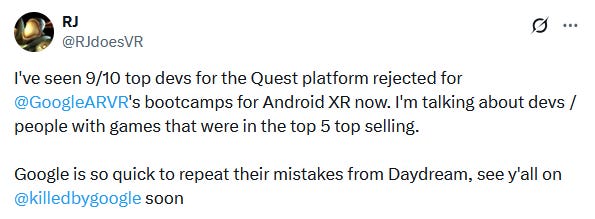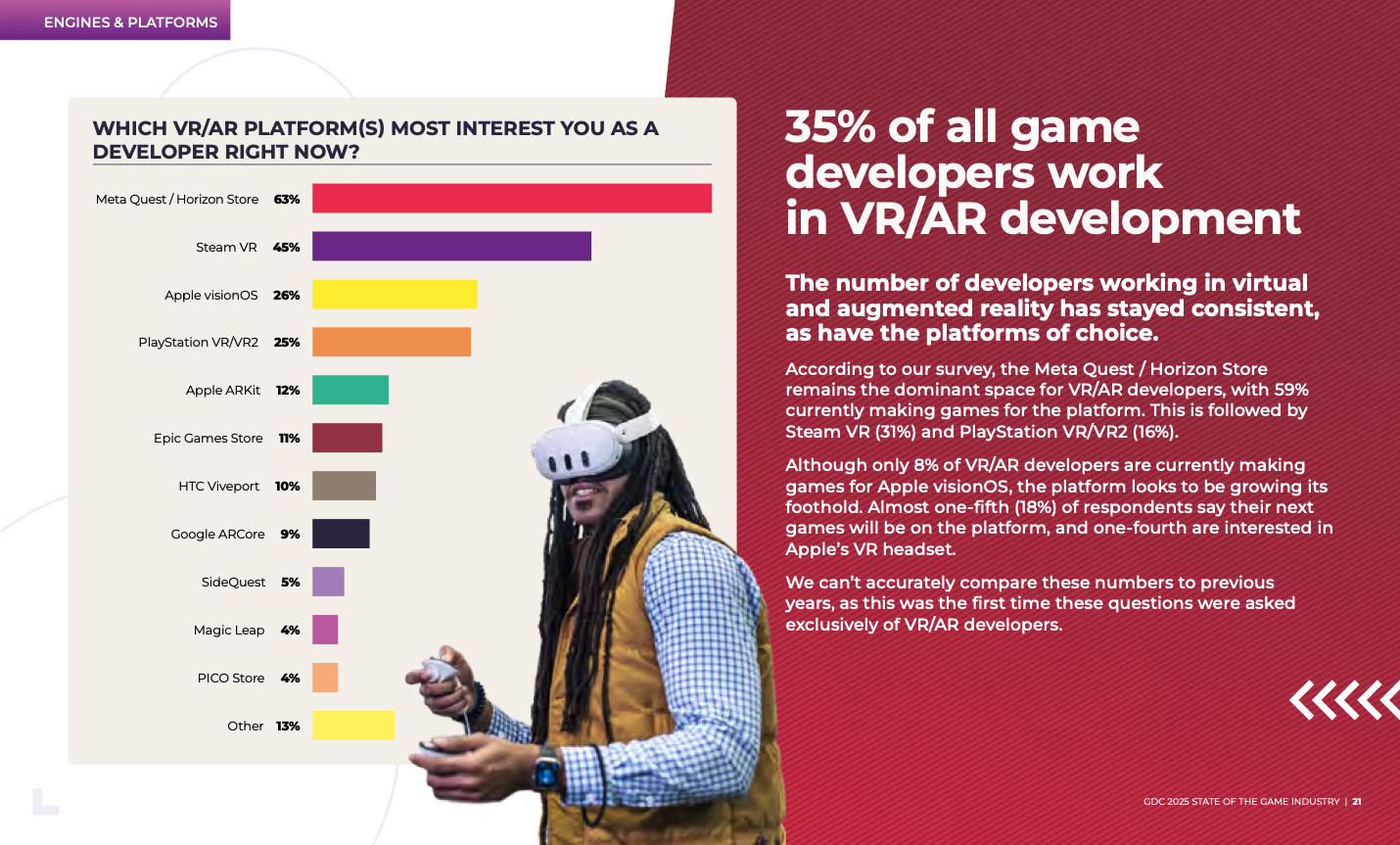Call off the search parties, start up the welcome parties - I’m back to spoil your inbox with more of my VR thoughts and cherry-picked bits of news that have caught my eye and had me a-musing and a-pondering. Sorry it’s been a couple of weeks since my last proper newsletter, but the biggest video games conference in the world meant that while my heart and soul were certainly with you all, my body was busy being cold and miserable here in the UK and my mind was tele-presencing over to San Francisco’s Moscone Center and into client offices in other spots around the globe. It’s been kinda crazy, but to be honest that’s very much the typical GDC experience, however you access it.
I had a sudden Conga-line of client work leading up to this year’s Game Developer Conference that then kept on going straight through the event itself, snaked it’s way out of the back of the week still grooving hard, and has kept on dancing down the road non-stop through this last week as well, leaving me in an exhausted heap here today. It’s been great, I’ve learned some new moves, and I’m certainly not going to complain about all the cardio benefits. But I do feel I should be apologizing to you for the absence it’s caused for this newsletter - sorry all. Needs must as the devil drives, kidsy-shoesy and all that.
This means that even though GDC actually wrapped up an eon ago and everyone has long since jetted back home (although a problem at Heathrow did see many friends and colleagues having to turn around 5 hours into their flight and return to San Francisco, then get rerouted all over the place to finally reach the UK a day or so late - what a nightmare), this is the first chance I’ve had to tell you about some of the developments, talk and nattering I’ve been hearing on the XR front. There’s some interesting stuff that came out of the week.
GDC and the general mood around XR right now
Now remember, I didn’t attend myself, but from everybody I’ve chatted with and heard from thus far, it seems that there was a lot of hope in general on the part of VR and MR developers. Lots of nuggets of positivity and cool ideas from various camps and demos - the typical situation at any large conference, and great to hear that the idea of VR and MR gaming and interactive narratives is still appealing despite the harsh financial landscape. VR adoption continues to grow, and there’s a lot of exciting headsets and peripheral hardware coming straight at us down the techo-highway. The snowball-roll of VR is continuing unabated. Keep moving forward.
But at the same time, I’m sensing there’s not much confidence that things are going to get better in the foreseeable future for app developers. Apparently Meta’s recent changes were the number one talking point, with a lot of devs seeing a switch to free-to-start, monetized apps being the only viable way forward now, much as is the case on mobile. (Check out my previous newsletters on this: there’s a lot to digest, but essentially this is about Meta changing direction to focus on free-to-start experiences aimed at ‘young teens’/kids, with a laser focus on the mobile version of their Horizon social space rather than the VR version, and a 1 year deadline to achieve it).
I think everyone can appreciate why Meta have made at least some of these cold business decisions based on the data points they’ve discussed, but it doesn’t help XR developers for whom the Meta Quest platform was their major, if not only, self-sustaining target platform. The appearance of a lot of titles across PCVR, PSVR and the smaller Android platforms (Pico, Pimax et al - so many platform names begin with a P) is often entirely dependent on the developers being able to fund development for these these secondary platforms due to their winnings on the Meta Store. That’s been a dependable approach for a few years, and was robust enough as a route for it to become a well traveled and (relatively) safe bet for cross-platform development. But with Meta’s recent New Year changes shifting their focus for 2025 squarely onto mainstream and minors as the best bet for growing user numbers at speed (amongst other things), the whole concept of navigating a safe and secure passage to market and profitability for sensible VR developers has been dashed against the rocks in an unexpected and rather tumultuous storm.
From what I’ve heard, the general mood is disappointment towards Meta, whom developers feel could and should have handled the transition to a new market model much more sympathetically for their existing bread winners - even if it turns out that Meta can make more sandwiches more cheaply if they switch to from artisan loafs to budget sliced. Those Artisans helped you win the best sandwich award that brought you your success, after all. The symbiotic relationship of high-quality, affordable hardware combined with great, well-developed software has been a viable route to Meta being able to offer a high quality and compelling end-user experience. That seemed to make sense for a long time, especially as we got comfortable, year after year, with Meta’s extraordinary quarterly spending on Reality Labs. Sure, we all commented that it was hard to see anything but a very long path to profitability for Meta, but the general acceptance was that this was just how Meta were rolling with this, with those multi-billion dollar pockets deep enough to subsidize the entire vertical for as long as necessary.
Whether that was a long bet, a long con, or a side effect of the crazy hubris of trying to build and control an entirely new mass market for themselves, all by themselves was always a worry for devs, but one that could be shelved for later, potentially years and years from now. It was well understood that VR and MR had to grow significantly larger in market penetration before those graphs at Meta HQ started to up-tick the hockey stick, but in the meantime, everyone accepted that, until we heard differently, Meta would more or less stay on the same path.
But the marks and tracks were there all along the trail for those who were looking - Meta was trying different things, and funding AA or AAA gaming onto the platform was one of many approaches they had been trying — albeit one they’d been running with constantly since day one. But we have seen their funding priorities shift variously over that time, moving towards shared worlds and exercise gaming, away from showcasing media and animation (a bigger focus in the early days), and away from supporting their own tools and features such as Quill, Spark and their popular fitness app Move (which incidentally finally terminated 31 March 2025, yesterday at time of writing) to name just a few. They’re methodically throwing all the viable shit at the wall to see what sticks and adjusting their priorities as they go, like any responsible business might do. But they’re doing it at a scale that has a big impact.
Along the way they’ve helped a lot of aspects of their VR/MR ecosystem to grow and attracted a lot of talented devs to the platform, and this has helped the wider XR landscape in many, many laudable ways. We should give credit where it’s due, while the sun has been shining on your specific sector or genre, lots of developers have benefited from a season of great growth and a bumper harvest. It’s the plain truth that Meta have done a lot to help the whole platform, and VR as a marketable proposition in general, to grow.
The benefactory, altruistic tendencies of Meta never operate outside of a sensible game-plan, of course. Meta are obviously going to be shining their lights on whichever growth approach offers the best promise to help them, at any given time, to reach their ultimate long-term goal. And of course, that ultimate end state is the Wall-E-fying of the biggest possible user-base, so they can show them ads supplied by a captive advertising market, and farm eternal fields of users as attention livestock for the rest of eternity. Because underneath everything else, we should never forget that they’re only in the social media and XR businesses as a means to an end; they’re really in the business of Ad-tech — which brought in an astonishing $164.5 billion in 2024, and accounted for 98% of their revenue. Everything else is in pursuance of eyeballs so that they can charge advertisers the most money, because they’ve got the best, most suitable users. I’m not giving spoilers here for anyone I’m sure, but it’s the appropriate moment in the episode to rip off the mask to reveal that, you guessed it, it’s Old Man Advertising that’s been the villain driving this all along. Zoinks!
If Meta’s current approach isn’t working as well as the free-to-start/monetized market looks like it could, nobody can reasonably find fault with that — if they have their business hat on. But with premium XR development times requiring increasingly longer runways and bigger budgets, it’s understandable why so many developers are feeling whiplash at the sudden change of direction. Once you’re into development, you’re reliant on the decisions you made at the start of the project, based on the situation there and then, and your best projections for the future. The further through production you go, the harder it is to make a hard pivot to something like free-to-start, and some of the affected devs have essentially seen months and even years of work upended by this sudden change in the landscape. Those who can’t make the hard turn needed are going to be speeding towards an uncertain road ahead.
In practical terms, I think there’s a real feeling that Meta have fumbled their relationship with developers by suddenly and abruptly cutting away the responsibilities and support they’ve long exhibited towards developers of premium Apps without much warning. “You’re wasting your life with this approach’, they’ve suddenly declared, “you want to get a proper career, you need to get into free-to-play my son, or we’re stopping your allowance”. “But Da,” the developers are saying, “my entire life you’ve told me to go premium or go home. You encouraged me down this path. You pretty much made this choice for me, and now the wind’s suddenly changed… Da, what the actual f—?”.
Meta, I imagine, aren’t seeing this quite the same way. They’re seeing it statistically. They’re being told by their data points that their previous approach is no longer considered the best approach. They’re seeing more significant growth is possible from younger players engaging with monetized, free-to-start experiences. It’s all for the best. Sure, parents ripping a band-aid off always think they’re doing the kindest thing, but those same parents also worry about the side-effects and betrayal of trust that it might cause. There are less painful and impactful ways to help someone who has been conditioned to trust and depend on your kindness. Maybe Meta see this as an inevitable checkpoint, the right time to push premium VR gaming out of the nest, to see if it can fly on it’s own without being mothered any more. It’s natures way, a ‘cruel-to-be-kind’ approach where the parent’s perspective is one of ultimate kindness and responsibility, but from the perspective of many members of the family they’ve helped create, nurture and raise, this translates instead into a potentially life-ending cruelty. And we’re seeing this alongside the horror of so many developers, large and small, who have fallen in the last few months alone. Both flegdlings and strong flyers are thudding to the floor at an alarming rate.
It’s not surprising that the reaction of vulnerable devs, seeing the limp bodies starting to pile up at the foot of the tree, is turning into one of panic, distrust and abandonment. Perhaps some kind of safety net now might be a good idea, although it’s hardly going to be as valuable as the missed opportunity to warn devs that this day would come as soon as they realised it, and making a staged transition that gave everyone a lot more time to react. Some have said Meta are out of touch with developers and how they’re struggling, and perhaps they never even considered this fallout (‘great at reading data, but bad at reading the room’ as one developer put it to me). Personally I think it more likely that they completely saw this as a likely result of their actions, but as business they just don’t really care. Businesses can’t care, they are, after all, just legal entities with no sentience or capacity for emotion. Only the people who make up the company have those abilities, but when the corporate veil can provide such thick armor and protect those within from any harm or personal liability for actions they take in pursuance of the company’s goals, an important human element gets squeezed out of the equation. Big tech, like all major corporate industries, has collectively become insensitive, proudly serving shareholders at the expense of customers, and replacing their individual empathy with collective apathy.
Last year everyone hung onto the mantra of ‘Survive Until 2025’, whereas this year it seems 2025 is going to be equally challenging (if not more so, considering the bonkers state of the world right now), and that the only sensible approach is accepting that this is the new reality, at least for the time being. Few in the VR and MR gaming sectors will emerge unscathed. But as the GDC attendees I spoke with indicated, there’s still a general sense that premium VR gaming and narrative titles will be able to survive in new lands, and that the current wider investment in VR hardware from manufacturers like Valve, Google, BigScreen, Pimax, Samsung, Immerse, and those crazy high-quality Apple Vision Pro clones that are coming in from China means that user numbers won’t only grow for Meta. They’re a mixed bag of different offerings targeting different users and use cases, and opening up the market with wider choice this way will definitely be a good thing in the longer term. Everyone living in the shade of the Meta tree should not be anyone’s hope for XR’s best future (except Zuckerberg and his higher ups, of course, who would like that very much). Hopefully those who manage to survive the flight from the nest with enough of their feathers still intact will find other, healthier and more predictable trees to nest in, and only need to visit Meta’s own tree when they choose to, rather than being based there because there’s no other way to survive.
Other Stuff!
Meta’s Director of Games Chris Pruett gave a session at GDC entitled ‘The Past, Present and Future of Developing VR and MR with Meta’ which was interesting for all kinds of reasons. Firstly, it directly builds on and addresses some of the points raised by Meta VP of Metaverse Content, Samantha Ryan, which caused a bit of a angry buzzing from developers which I covered in my 11 Feb newsletter. Secondly, he revealed some interesting facts and figures from 2024;
Monthly headset usage increased 30% in 2024
Q3 having their highest retention so far for any headset
Total platform spending increased 12% in 2024
The majority of revenue still coming from paid titles.
Quest 3s users are younger on average, have a lower disposable income than ‘VR Elites’ (what a horrible term), and now represent the majority in both buying and actively using the headset.
He also highlighted a newly emerging audience of mainstream adult users, who use the headset mostly for media consumption. Pruett says “These are largely 30-something men who enjoy spending money on high-fidelity ways to watch their favorite movies and shows. They like sports, action movies, concerts—all kinds of stuff.” And by ‘all kinds of stuff’, he’s almost definitely talking about porn, right? I mean come on, let’s be real.
Meta Blog | Chris Pruett GDC talk overview
Android developers are worried about Google’s XR plans and say "Google is treading the same path towards failure that they did with Stadia and Daydream. By shutting out some of the most experienced and smaller studios and developers, they're showing they've learned zero lessons with how to manage or grow a modern software platform". As if that’s not bad enough, the platform is being accused of being prejudiced against existing Quest developers by rejecting them from their AR VR Bootcamps;
Android Central | Google ignored Android XR, indie VR Devs are concerned
Every year for GDC, a survey is sent to attendees to get a bottled, but reasonable accurate view of the current state of the Games industry. This year’s State of the Industry report polled VR devs as an independent unit, and gave us a VR/AR slide that caught my eye and filled me with a wee squidgeon1 of hope:
Some quick thoughts on this -
35% of all developers attending GDC work in VR/AR development, which is consistent with previous years. This in itself is a little reassuring. When you consider that GDC is (a) very popular , (b) attracts devs from all over the world, and (c) tends to be fairly expensive to attend and so naturally filters out a lot of the smaller garage-enthusiast level of developers, this is a reassuring picture of the dev scene to hang onto for hope and comfort, and a reminder that for all the canceled projects and folding teams we’ve seen the past 12 months, there are still a large number of devs out there working in XR gaming and narrative. I honestly expected this number would be noticeably smaller this year.
In terms of what platforms developers are currently working on, Meta (59%) seems lower than I would have expected, Steam VR (31%) seems a little higher than expected, but PSVR2 (16%) seems juuuuust about right. Not implying it’s in some kind of magical VR Goldilocks zone or anything with that comment, it’s more ‘this porridge is disappointing, but I expected as much’ sense.
In terms of platform interest for the future, as shown on the graph, Meta Store and Horizon are clearly where most of the focus is, no surprise. I suspect that picture will be more interesting next year. It’s promising to see that PCVR, PSVR2 and Apple Vision Pro are getting such a high degree of interest, though.
It’s worth remembering that this year’s attendance was smaller than usual, and skewed significantly in favour of US attendees. That perhaps twists the results, sometimes for the better (bullet point 1, ‘35%’) and sometimes for the worse (bullet points 2 & 3 perhaps). For some reason I can’t quite put my finger on, a lot of European devs decided not to take a journey to the US this year…
You can download the full GDC State of the Industry Report for free here -
https://reg.gdconf.com/state-of-game-industry-2025
You can listen to me on the AMATA WORLD podcast!
I was recently invited to appear on Ana Domina and Bryan Yap's excellent Amata World podcast to chat about the state of VR, my career journey (Comics Writer > Law Degree > Banking Systems Troubleshooter > Graphic Designer > Game Designer > Game Director > PSVR Pioneer > XR Design Consultant) which is certainly not a very typical path to any kind of work, as well as lots of chatter about the importance of ensuring a first class user experience in XR projects. It was my first time on someone else's podcast (would you believe) and I really enjoyed it - Ana and Bryan were great and looked after me fantastically as a first-timer guest virgin!
If you have eyes and/or ears to spare today for more XR goodness, and want to hear more of my northern English ramblings, feel free to point your primary sensory organs at any of the links below >>
Spotify | https://lnkd.in/ekpiJtKs
Apple | https://lnkd.in/e_qH3BaM
Youtube | https://lnkd.in/eSi2AaWC
Website | https://amata.world/#podcast
eBook Update
I just need to find a spare half a day to set up the hosting page and I’ll be sending those download links out to all of you lovely subscribers!! Feel free to blame GDC and my client work getting in the way of course! Sit tight, it’s on it’s way super-soon, I double-pinky-promise. 😁
Until next time,
Jed
Jed Ashforth has been working in the games industry since 2002, and working with VR, MR and AR apps since 2010. He has too many headsets and not enough time. If you’re interested to find out more (or even bring him on board to help you) you can reach him, and check out more of his work and articles, at www.realisedrealities.com.
All of my illustrations and text - in fact everything in this newsletter - is achieved without the use of AI. I like writing, and I like doing graphic design. Call me human, but I like doing the fun bits myself.
I accept that this is probably not an internationally understood term. A squidgeon sounds like some clever portmanteau of Squid and Pigeon (maybe not that clever) but there’s no link there. It just means ‘a small amount’ - at least it did colloquially in Sheffield when I was growing up. It was also a really great name to have wasted on my worst Pokemon.









The burnt trust of Meta’s whiplash inducing pivot could end up being the biggest cost to them in the long run.